- Home
- J. K. Rowling
The Ickabog Page 7
The Ickabog Read online
Page 7
“It makes no difference to me whether a man is a cheesemaker or a king, so long as he behaves with honor,” said Eslanda. “And the king will be dishonored, if those soldiers are shot without trial, and so I’ll tell him, when he wakes.”
Lady Eslanda then turned, trembling, and climbed the spiral staircase. She had no idea whether she’d said enough to save the soldiers’ lives, so she spent a sleepless night.
Spittleworth remained standing in the chilly passage until his feet were so cold he could barely feel them. He was trying to decide what to do.
On the one hand, he really did want to get rid of these soldiers, who knew far too much.
On the other, he feared Lady Eslanda was right: people would blame the king if the men were shot without trial. Then Fred would be angry at Spittleworth, and might even take the job of Chief Advisor away from him. If that happened, all the dreams of power and riches that Spittleworth had enjoyed on the journey back from the Marshlands would be dashed.
So Spittleworth turned away from the dungeon door and headed to his bed. He was deeply offended by the idea that Lady Eslanda, whom he’d once hoped to marry, preferred the son of cheesemakers. As he blew out his candle, Spittleworth decided that she would pay, one day, for that insult.
He turned and saw Lady Eslanda, raven-haired and serious.
By Maya, Age 11
When King Fred woke next morning and was informed that his Chief Advisor had retired at this critical moment in the country’s history, he was furious. It came as a great relief to know that Lord Spittleworth would be taking over, because Fred knew that Spittleworth understood the grave danger facing the kingdom.
Though feeling safer now that he was back in his palace, with its high walls and cannon-mounted turrets, its portcullis and its moat, Fred was unable to shake off the shock of his trip. He stayed shut up in his private apartments, and had all his meals brought to him on golden trays. Instead of going hunting, he paced up and down on his thick carpets, reliving his awful adventure in the north, and meeting only his two best friends, who were careful to keep his fears alive.
On the third day after their return from the Marshlands, Spittleworth entered the king’s private apartments with a somber face, and announced that the soldiers who’d been sent back to the marsh to find out what happened to Private Nobby Buttons had discovered nothing but his bloodstained shoes, a single horseshoe, and a few well-gnawed bones.
The king turned white and sat down hard on a satin sofa.
“Oh, how dreadful, how dreadful … Private Buttons … Remind me, which one was he?”
“Young man, freckles, only son of a widowed mother,” said Spittleworth. “The newest recruit to the Royal Guard, and such a promising boy. Tragic, really. And the worst of it is, between Beamish and Buttons, the Ickabog has developed a taste for human flesh — precisely as Your Majesty predicted. It is really astonishing, if I may say so, how Your Majesty grasped the danger from the first.”
“B-but what is to be done, Spittleworth? If the monster is hungry for more human prey …”
“Leave it all to me, Your Majesty,” said Spittleworth soothingly. “I’m Chief Advisor, you know, and I’m at work day and night to keep the kingdom safe.”
“I’m so glad Herringbone appointed you his successor, Spittleworth,” said Fred. “What would I do without you?”
“Tish, pish, Your Majesty, ’tis an honor to serve so gracious a king.
“Now, we ought to discuss tomorrow’s funerals. We’re intending to bury what’s left of Buttons next to Major Beamish. It is to be a state occasion, you know, with plenty of pomp and ceremony, and I think it would be a very nice touch if you could present the Medal for Outstanding Bravery Against the Deadly Ickabog to relatives of the dead men.”
“Oh, is there a medal?” said Fred.
“Certainly there is, sire, and that reminds me — you haven’t yet received your own.”
From an inner pocket, Spittleworth pulled out a most gorgeous gold medal, almost as large as a saucer. Embossed upon the medal was a monster with gleaming ruby eyes, which was being fought by a handsome, muscular man wearing a crown. The whole thing was suspended from a scarlet velvet ribbon.
“Mine?” said the king, wide-eyed.
“But of course, sire!” said Spittleworth. “Did Your Majesty not plunge your sword into the monster’s loathsome neck? We all remember it happening, sire!”
King Fred fingered the heavy gold medal. Though he said nothing, he was undergoing a silent struggle.
Fred’s honesty had piped up, in a small, clear voice: “It didn’t happen like that. You know it didn’t. You saw the Ickabog in the fog, you dropped your sword, and you ran away. You never stabbed it. You were never near enough!”
But Fred’s cowardice blustered louder than his honesty: “You’ve already agreed with Spittleworth that that’s what happened! What a fool you’ll look if you admit you ran away!”
And Fred’s vanity spoke loudest of all: “After all, I was the one who led the hunt for the Ickabog! I was the one who saw it first! I deserve this medal, and it will stand out beautifully against that black funeral suit.”
So Fred said:
“Yes, Spittleworth, it all happened just as you said. Naturally, one doesn’t like to boast.”
“Your Majesty’s modesty is legendary,” said Spittleworth, bowing low to hide his smirk.
The following day was declared a national day of mourning in honor of the Ickabog’s victims. Crowds lined the streets to watch Major Beamish’s and Private Buttons’s coffins pass on wagons drawn by plumed black horses.
King Fred rode behind the coffins on a jet-black horse, with the Medal for Outstanding Bravery Against the Deadly Ickabog bouncing on his chest and reflecting the sunlight so brightly that it hurt the eyes of the crowd. Behind the king walked Mrs. Beamish and Bert, also dressed in black, and behind them came a howling old woman in a ginger wig, who’d been introduced to them as Mrs. Buttons, Nobby’s mother.
“Oh, my Nobby,” she wailed as she walked. “Oh, down with the awful Ickabog, who killed my poor Nobby!”
The coffins were lowered into graves and the national anthem was played by the king’s buglers. Buttons’s coffin was particularly heavy, because it had been filled with bricks. The odd-looking Mrs. Buttons wailed and cursed the Ickabog again while ten sweating men lowered her son’s coffin into the ground. Mrs. Beamish and Bert stood quietly weeping.
Then King Fred called the grieving relatives forward to receive their men’s medals. Spittleworth hadn’t been prepared to spend as much money on Beamish and the imaginary Buttons as he’d spent on the king, so their medals were made of silver rather than gold. However, it made an affecting ceremony, especially as Mrs. Buttons was so overcome that she fell to the ground and kissed the king’s boots.
Mrs. Beamish and Bert walked home from the funeral and the crowds parted respectfully to let them pass. Only once did Mrs. Beamish pause, and that was when her old friend Mr. Dovetail stepped out of the crowd to tell her how sorry he was. The two embraced. Daisy wanted to say something to Bert, but the whole crowd was staring, and she couldn’t even catch his eye, because he was scowling at his feet. Before she knew it, her father had released Mrs. Beamish, and Daisy watched her best friend and his mother walk out of sight.
Once they were back in their cottage, Mrs. Beamish threw herself facedown on her bed where she sobbed and sobbed. Bert tried to comfort her, but nothing worked, so he took his father’s medal into his own bedroom and placed it on the mantelpiece.
Only when he stood back to look at it did he realize that he’d placed his father’s medal right beside the wooden Ickabog that Mr. Dovetail had carved for him so long ago. Until this moment, Bert hadn’t connected the toy Ickabog with the way his father had died.
Now he lifted the wooden model from its shelf, placed it on the floor, picked up a poker, and smashed the toy Ickabog to splinters. Then he picked up the remnants of the shattered toy and threw them into the fire
. As he watched the flames leap higher and higher, he vowed that one day, when he was old enough, he’d hunt down the Ickabog, and revenge himself upon the monster that had killed his father.
The morning after the funerals, Spittleworth knocked on the door of the king’s apartments again and entered, carrying a lot of scrolls, which he let fall onto the table where the king sat.
“Spittleworth,” said Fred, who was still wearing his Medal for Outstanding Bravery Against the Deadly Ickabog, and had dressed in a scarlet suit, the better to show it off, “these cakes aren’t as good as usual.”
“Oh, I’m sorry to hear that, Your Majesty,” said Spittleworth. “I thought it right for the widow Beamish to take a few days off work. These are the work of the under-pastry chef.”
“Well, they’re chewy,” said Fred, dropping half his Folderol Fancy back on his plate. “And what are all these scrolls?”
“These, sire, are suggestions for improving the kingdom’s defenses against the Ickabog,” said Spittleworth.
“Excellent, excellent,” said King Fred, moving the cakes and the teapot aside to make more room as Spittleworth pulled up a chair.
“The very first thing to be done, Your Majesty, was to find out as much as we could about the Ickabog itself, the better to discover how to defeat it.”
“Well, yes, but how, Spittleworth? The monster is a mystery! Everyone’s thought it a fantasy all these years!”
“That, forgive me, is where Your Majesty is wrong,” said Spittleworth. “By dint of ceaseless searching, I’ve managed to find the foremost Ickabog expert in all of Cornucopia. Lord Flapoon is waiting with him in the hall. With Your Majesty’s permission —”
“Bring him in, bring him in, do!” said Fred excitedly.
So Spittleworth left the room and returned shortly afterward with Lord Flapoon and a little old man with snowy-white hair and spectacles so thick that his eyes had vanished almost into nothingness.
“This, sire, is Professor Fraudysham,” said Flapoon, as the mole-like little man made a deep bow to the king. “What he doesn’t know about Ickabogs isn’t worth knowing!”
“How is it that I’ve never heard of you before, Professor Fraudysham?” asked the king, who was thinking that if he’d known the Ickabog was real enough to have its own expert, he’d never have gone looking for it in the first place.
“I live a retired life, Your Majesty,” said Professor Fraudysham, with a second bow. “So few people believe in the Ickabog that I’ve formed the habit of keeping my knowledge to myself.”
King Fred was satisfied with this answer, which was a relief to Spittleworth, because Professor Fraudysham was no more real than Private Nobby Buttons or, indeed, old Widow Buttons in her ginger wig, who’d howled at Nobby’s funeral. The truth was that beneath the wigs and the glasses, Professor Fraudysham and Widow Buttons were the same person: Lord Spittleworth’s butler, who was called Otto Scrumble, and looked after Lord Spittleworth’s estate while he lived at the palace. Like his master, Scrumble would do anything for gold, and had agreed to impersonate both the widow and the professor for a hundred ducats.
“So, what can you tell us about the Ickabog, Professor Fraudysham?” asked the king.
“Well, let’s see,” said the pretend professor, who’d been told by Spittleworth what he ought to say. “It’s as tall as two horses —”
“If not taller,” interrupted Fred, whose nightmares had featured a gigantic Ickabog ever since he’d returned from the Marshlands.
“If, as Your Majesty says, not taller,” agreed Fraudysham. “I should estimate that a medium-sized Ickabog would be as tall as two horses, whereas a large specimen might reach the size of — let’s see —”
“Two elephants,” suggested the king.
“Two elephants,” agreed Fraudysham. “And with eyes like lamps —”
“Or glowing balls of fire,” suggested the king.
“The very image I was about to employ, sire!” said Fraudysham.
“And can the monster really speak in a human tongue?” asked Fred, in whose nightmares the monster whispered, “The king … I want the king … where are you, little king?” as it crept through the dark streets toward the palace.
“Yes, indeed,” said Fraudysham, with another low bow. “We believe the Ickabog learned to speak Human by taking people prisoner. Before disemboweling and eating its victims, we believe it forces them to give it English lessons.”
“Suffering Saints, what savagery!” whispered Fred, who’d turned pale.
“Moreover,” said Fraudysham, “the Ickabog has a long and vengeful memory. If outwitted by a victim — as you outwitted it, sire, by escaping its deadly clutches — it has sometimes sneaked out of the marsh under cover of darkness, and claimed its victim while he or she slept.”
Whiter than the snowy icing on his half-eaten Folderol Fancy, Fred croaked:
“What’s to be done? I’m doomed!”
“Nonsense, Your Majesty,” said Spittleworth bracingly. “I’ve devised a whole raft of measures for your protection.”
So saying, Spittleworth took hold of one of the scrolls he’d brought with him and unrolled it. There, covering most of the table, was a colored picture of a monster that resembled a dragon. It was huge and ugly, with thick black scales, gleaming white eyes, a tail that ended in a poisonous spike, a fanged mouth large enough to swallow a man, and long, razor-sharp claws.
“There are several problems to be overcome, when defending against an Ickabog,” said Professor Fraudysham, now taking out a short stick and pointing in turn to the fangs, the claws, and the poisonous tail. “But the most difficult challenge is that killing an Ickabog causes two new Ickabogs to emerge from the corpse of the first.”
“Surely not?” said Fred faintly.
“Oh, yes, Your Majesty,” said Fraudysham. “I’ve made a lifelong study of the monster, and I can assure you that my findings are quite correct.”
“Your Majesty might remember that many of the old tales of the Ickabog make mention of this curious fact,” interjected Spittleworth, who really needed the king to believe in this particular trait of the Ickabog, because most of his plan relied on it.
“But it seems so — so unlikely!” said Fred weakly.
“It does seem unlikely on the face of it, doesn’t it, sire?” said Spittleworth, with another bow. “In truth, it’s one of those extraordinary, unbelievable ideas that only the very cleverest people can grasp, whereas common folk — stupid folk, sire — giggle and laugh at the notion.”
Fred looked from Spittleworth to Flapoon to Professor Fraudysham; all three men seemed to be waiting for him to prove how clever he was, and naturally he didn’t want to seem stupid, so he said:
“Yes … well, if the professor says it, that’s good enough for me … but if the monster turns into two monsters every time it dies, how do we kill it?”
“Well, in the first phase of our plan, we don’t,” said Spittleworth.
“We don’t?” said Fred, crestfallen.
Spittleworth now unrolled a second scroll, which showed a map of Cornucopia. The northernmost tip had a drawing of a gigantic Ickabog on it. All around the edge of the wide marsh stood a hundred little stick figures, holding swords. Fred looked closely to see whether any of them were wearing a crown, and was relieved to see that none were.
“As you can see, Your Majesty, our first proposal is a special Ickabog Defense Brigade. These men will patrol the edge of the Marshlands, to ensure that the Ickabog can’t leave the marsh. We estimate the cost of such a brigade, including uniforms, weapons, horses, wages, training, board, lodging, sick pay, danger money, birthday presents, and medals to be around ten thousand gold ducats.”
“Ten thousand ducats?” repeated King Fred. “That’s a lot of gold. However, when it comes to protecting me — I mean to say, when it comes to protecting Cornucopia —”
“Ten thousand ducats a month is a small price to pay,” finished Spittleworth.
“Ten thousand
a month!” yelped Fred.
“Yes, sire,” said Spittleworth. “If we’re to truly defend the kingdom, the expense will be considerable. However, if Your Majesty feels we could manage with fewer weapons —”
“No, no, I didn’t say that —”
“Naturally, we don’t expect Your Majesty to bear the expense alone,” continued Spittleworth.
“You don’t?” said Fred, suddenly hopeful.
“Oh, no, sire, that would be grossly unfair. After all, the entire country will benefit from the Ickabog Defense Brigade. I suggest we impose an Ickabog tax. We’ll ask every household in Cornucopia to pay one gold ducat a month. Of course, this will mean the recruitment and training of many new tax collectors, but if we raise the amount to two ducats, we’ll cover the cost of them too.”
“Admirable, Spittleworth!” said King Fred. “What a brain you have! Why, two ducats a month — people will barely notice the loss.”
“There are several problems to be overcome, when defending against an Ickabog.”
By Esmé, Age 10
And so a monthly tax of two gold ducats was imposed on every household in Cornucopia, to protect the country from the Ickabog. Tax collectors soon became a common sight on the streets of Cornucopia. They had large, staring white eyes like lamps painted on the backs of their black uniforms. These were supposed to remind everybody of what the tax was for but people whispered in the taverns that they were Lord Spittleworth’s eyes, watching to make sure everybody paid up.
Once they’d collected enough gold, Spittleworth decided to raise a statue to the memory of one of the Ickabog’s victims, to remind people what a savage beast it was. At first Spittleworth planned a statue of Major Beamish, but his spies in the taverns of Chouxville reported that it was Private Buttons’s story that had really captured the public imagination. Brave young Buttons, who’d volunteered to gallop off into the night with the news of his major’s death, only to end up in the Ickabog’s jaws himself, was generally felt to be a tragic, noble figure deserving of a handsome statue. Major Beamish, on the other hand, seemed merely to have died by accident, blundering unwisely across the foggy marsh in the dark. In fact, the drinkers of Chouxville felt quite resentful toward Beamish, as the man who’d forced Nobby Buttons to risk his life.

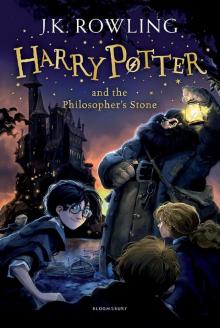 Harry Potter and the Philosophers Stone
Harry Potter and the Philosophers Stone Harry Potter and the Chamber of Secrets
Harry Potter and the Chamber of Secrets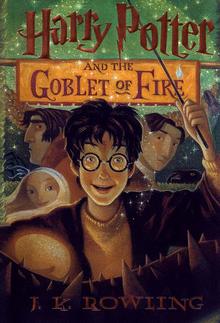 Harry Potter and the Goblet of Fire
Harry Potter and the Goblet of Fire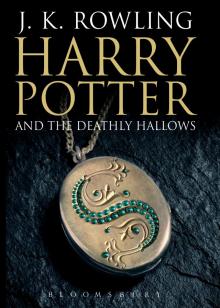 Harry Potter and the Deathly Hallows
Harry Potter and the Deathly Hallows Harry Potter and the Order of the Phoenix
Harry Potter and the Order of the Phoenix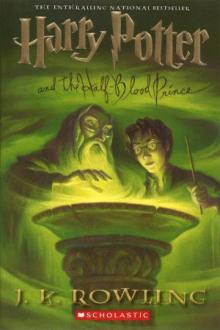 Harry Potter and the Half-Blood Prince
Harry Potter and the Half-Blood Prince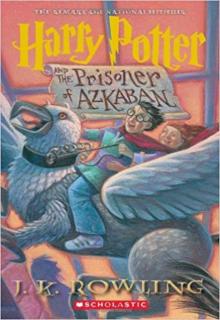 Harry Potter and the Prisoner of Azkaban
Harry Potter and the Prisoner of Azkaban Fantastic Beasts and Where to Find Them
Fantastic Beasts and Where to Find Them Short Stories from Hogwarts of Heroism, Hardship and Dangerous Hobbies
Short Stories from Hogwarts of Heroism, Hardship and Dangerous Hobbies Hogwarts: An Incomplete and Unreliable Guide
Hogwarts: An Incomplete and Unreliable Guide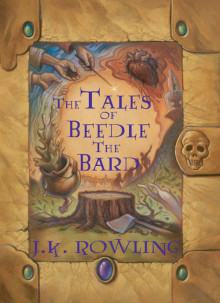 The Tales of Beedle the Bard
The Tales of Beedle the Bard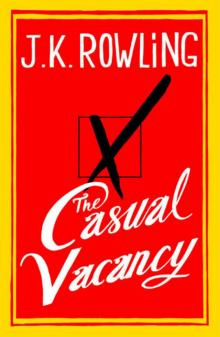 The Casual Vacancy
The Casual Vacancy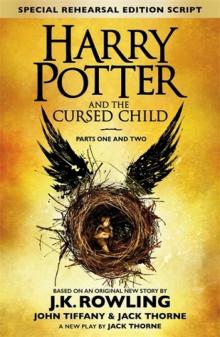 Harry Potter and the Cursed Child
Harry Potter and the Cursed Child Short Stories from Hogwarts of Power, Politics and Pesky Poltergeists
Short Stories from Hogwarts of Power, Politics and Pesky Poltergeists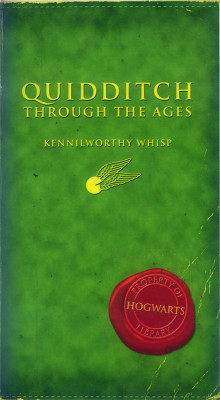 Quidditch Through the Ages
Quidditch Through the Ages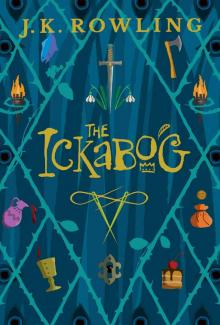 The Ickabog
The Ickabog![Fantastic Beasts, The Crimes of Grindelwald [UK] Read online](http://i1.bookreadfree.com/i/03/19/fantastic_beasts_the_crimes_of_grindelwald_uk_preview.jpg) Fantastic Beasts, The Crimes of Grindelwald [UK]
Fantastic Beasts, The Crimes of Grindelwald [UK]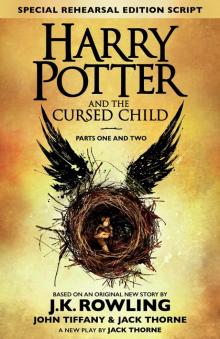 Harry Potter and the Cursed Child: Parts One and Two
Harry Potter and the Cursed Child: Parts One and Two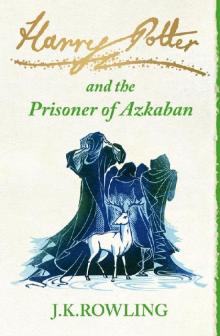 The Prisoner of Azkaban
The Prisoner of Azkaban Fantastic Beasts: The Crimes of Grindelwald
Fantastic Beasts: The Crimes of Grindelwald The Hogwarts Library Collection
The Hogwarts Library Collection Short Stories from Hogwarts of Heroism, Hardship and Dangerous Hobbies (Kindle Single) (Pottermore Presents)
Short Stories from Hogwarts of Heroism, Hardship and Dangerous Hobbies (Kindle Single) (Pottermore Presents)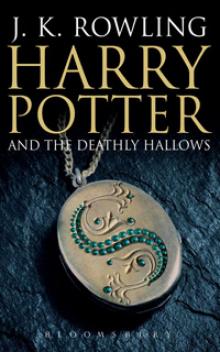 Harry Potter and the Deathly Hallows hp-7
Harry Potter and the Deathly Hallows hp-7 Hogwarts: An Incomplete and Unreliable Guide (Kindle Single) (Pottermore Presents)
Hogwarts: An Incomplete and Unreliable Guide (Kindle Single) (Pottermore Presents)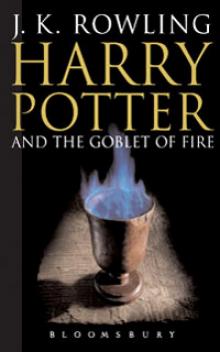 Harry Potter and the Goblet of Fire hp-4
Harry Potter and the Goblet of Fire hp-4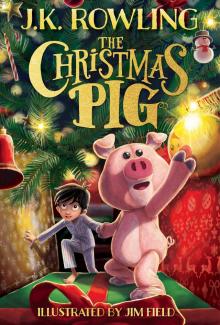 The Christmas Pig
The Christmas Pig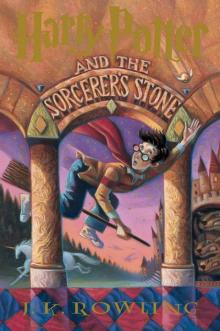 Harry Potter and the Sorcerer's Stone
Harry Potter and the Sorcerer's Stone The Order of the Phoenix
The Order of the Phoenix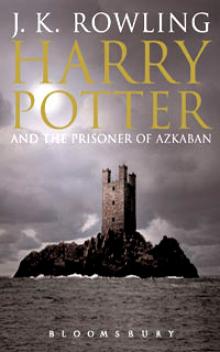 Harry Potter and the Prisoner of Azkaban hp-3
Harry Potter and the Prisoner of Azkaban hp-3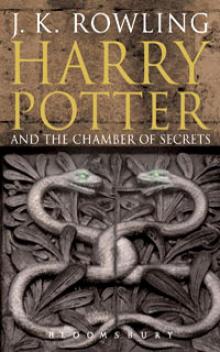 Harry Potter and the Chamber of Secrets hp-2
Harry Potter and the Chamber of Secrets hp-2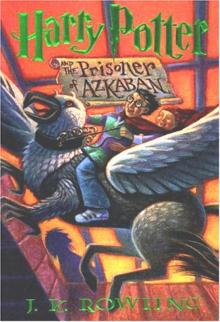 HP 3 - Harry Potter and the Prisoner of Azkaban
HP 3 - Harry Potter and the Prisoner of Azkaban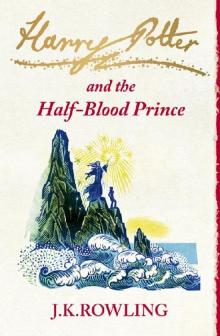 The Half-Blood Prince
The Half-Blood Prince The Hogwarts Collection
The Hogwarts Collection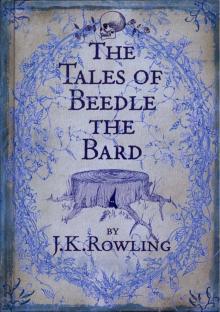 Tales of Beedle the Bard
Tales of Beedle the Bard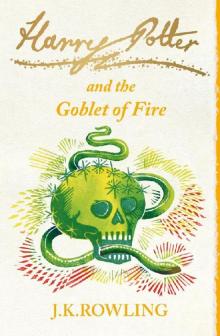 The Goblet of Fire
The Goblet of Fire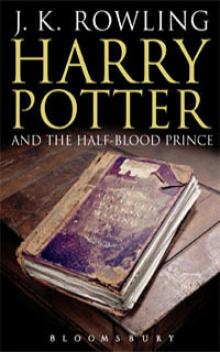 Harry Potter and the Half-Blood Prince hp-6
Harry Potter and the Half-Blood Prince hp-6 Short Stories from Hogwarts of Power, Politics and Pesky Poltergeists (Kindle Single) (Pottermore Presents)
Short Stories from Hogwarts of Power, Politics and Pesky Poltergeists (Kindle Single) (Pottermore Presents)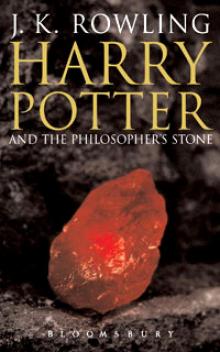 Harry Potter and the Sorcerer's Stone hp-1
Harry Potter and the Sorcerer's Stone hp-1